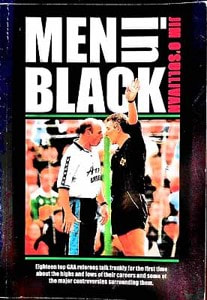
The quote in the above paragraph, and the one in the title of this blog post, are from a lovely book by Jim O’Sullivan. Published in 2002, Men in Black is Jim’s conversation with 18 GAA referees. As I grew older, I learned to appreciate Jim’s reporting style. He described the game but tended to let the reader draw their own conclusions about how the teams and players had performed. The book is written in a similar style. This is a book about those who held the whistle. It is not a book about Jim O’Sullivan. Like a good referee, he does not seek to insert himself into the narrative.
One of the recurring themes in the book is the effort of the referees to let the game “flow”. One account opens with the hypothesis that letting the game flow could be measured by the number of free shots awarded. One regularly hears the same idea nowadays. Most commentators claim that the best hurling game of 2022 was the Munster hurling final and that the referee let the game “flow”. However, the number of free shots awarded does not support the hypothesis. The problem is not with the view of the game or the refereeing. The problem is the measure of "flow" that is used. The 2022 Munster hurling final was in the upper end of the distribution for the number of free shots awarded.
An increasingly rare contributor to this blog advocates a better measure. John Eakins says that the flow of the game is best measured by the free shots NOT awarded. I think he is correct. The problem is with empirical verification. There is no data on the number of free shots not awarded. In last year’s Munster final, there was an implicit agreement between the players and the referee that there would be a high burden of proof on what constituted foul play. The players adjusted and some of the exchanges were extremely robust. Some off-the-ball stuff bordered on assault. Gladiatorial stuff. Great viewing. But there were plenty of frees awarded and nearly all were well deserved.
My economist-self has written that the competitive balance of the game can help explain its appeal (here). It helps. But I know in my bones that the physicality is at least as important to the viewer. The players knew it in their bones the day of the final.
 RSS Feed
RSS Feed